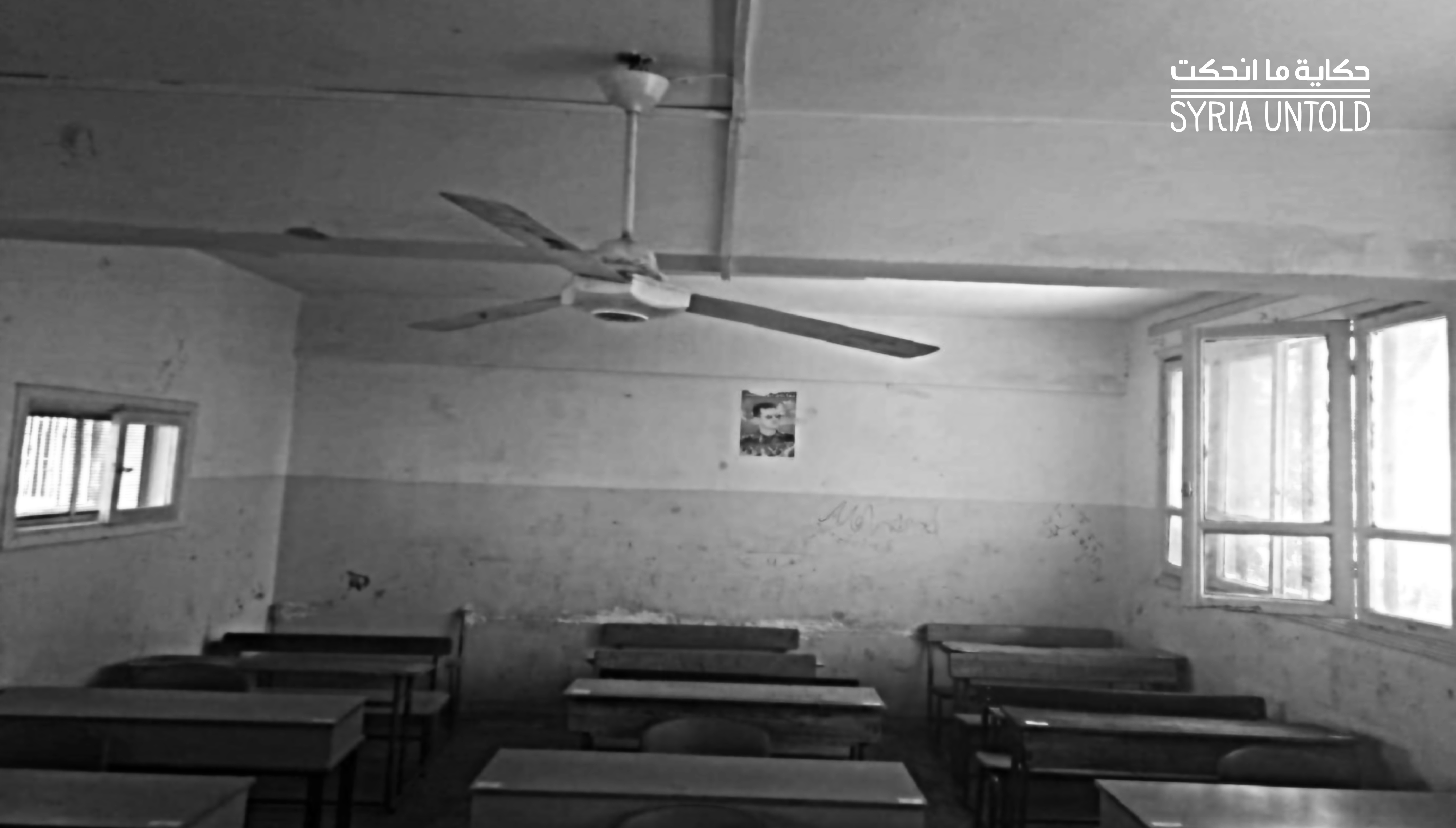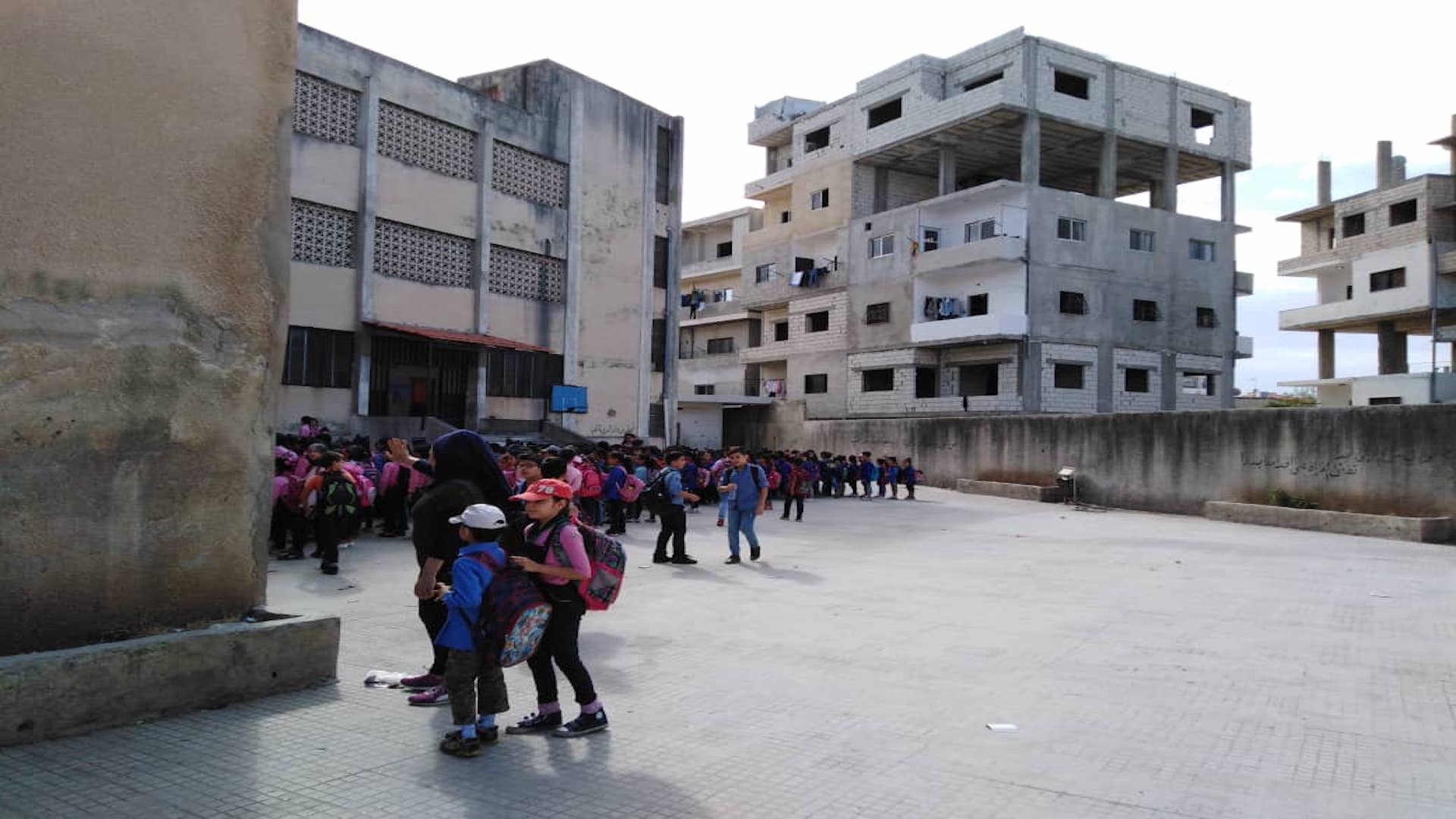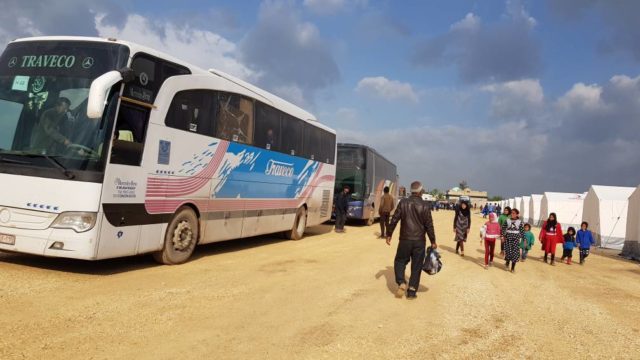Mahmoud* is a 42-year-old teacher in Damascus. But it’s not his only job.
He also moonlights as an accountant for a restaurant, having been forced to look for more work once his teaching income barely reached 42,000 Syrian pounds (around $70) and couldn’t cover even his basic daily needs.
“How can I possibly take care of my students and offer them the best education, when I have to work overtime for eight hours per day?” he asks. “I always end up feeling drained of energy. That effects my performance as a teacher.”
It's not just teachers taking on extra work.
Abdelrahman, a 15-year-old student, works at a fast food restaurant for a 5,000 Syrian pound ($75) wage, ever since his family lost its main breadwinner as a result of the war.
“How can I succeed if I can’t find time to study? How can I learn, knowing that my family and I are threatened with poverty and starvation each day?” Abdelrahman says.
Mahmoud’s situation resembles that of most currently practicing teachers in the Syrian capital. With more than 80 percent of Syrians now living below the poverty line, the deteriorating economic situation after years of war means that many teachers are forced to juggle multiple jobs at the same time, while also working overtime shifts. They are often met with stares of pity and mockery, especially those who work in factories, grocery stores and restaurants, or as taxi drivers, to make ends meet.
The income of a teacher “raising generations” nowadays can fluctuate anywhere between the equivalent of $70 and $80—and at best, it could reach $100. Even then, that's still barely enough to pay rent for a liveable house in the city.
Teachers: 'Raising generations’ between pity and mockery
Salim, 45, teaches at a high school in Damascus before working overtime at a shop. He says he often finds himself in embarrassing situations with his students.
“My students often come by the shop to buy things, and students from other neighbourhoods deliberately come to see me to inspect how different I am compared to school,” he tells Syria Untold. “Some troublemakers walk in front of the shop at night, come in every few minutes to buy something and treat me like just another storekeeper.”
“At school, I can sense the students winking at one other mockingly and whispering, ‘There he is! The man with a double personality!’”
Salim remembers how another student once asked him whether a carton of juice was cheaper in the school canteen, or in the shop.
‘Sir, your products are much better than those at school,’ Salim recalls another student saying sarcastically.
Ghassan, another teacher in his 40s, drives a cab in the evenings after school.
“While I’m driving the cab, I often stumble on students I’ve taught in previous years, and I feel embarrassed somehow.”
“The most embarrassing and unforgettable situation was when a girl who turned out to be one of my 11th grade students hailed the cab along with another woman, and I picked them up. I could see her inspecting me with her shocked stares, and she showered me with embarrassing questions until my whole face turned red. I felt uneasy and started sweating,” Ghassan explains.
“A few days later, her mother called me, after having taken my number, to ask for a lift. When I arrived, I was surprised to see my student and three of her friends waiting for me in front of the house to drop them off at their friend’s birthday.”
Bitterly, he continues. “I honestly can't describe how I felt that day, driving a car that was filled with their mocking giggles.”
 A classroom in Damascus, 2019. Photo by Syria Untold.
A classroom in Damascus, 2019. Photo by Syria Untold. Once a well-respected profession
It’s a far cry from the pre-war years in Syria, when teachers were often respected and seen as having social standing on account of their jobs.
But today, teachers in Damascus say they are ashamed of their profession.
Shadi, a 36-year-old teacher, says that his fiancée will often tell him: ‘You’re just a teacher; you can’t have a family.’
“Because my income as a teacher is low, I haven’t been able to marry her,” he explains, adding that their wedding has been put off for two years because of the costs.
“My friends also mock my job, comparing me with them. When we go out to cafes, they won’t let me contribute to the bill. 'You're a poor teacher,’ they tell me sarcastically. ‘You deserve charity’.”
All of these pressures impact teachers’ work, as well as their lives at home.
Mahmoud says he goes home at 11pm each night feeling “jaded and powerless.”
“I barely see my wife and children because I’m sleepy,” he says. “I wake up the next morning for school, where I feel tired, bored and snappy. Information gets mixed up in my head, and I feel like there’s a barrier between me and the students.”
With many teachers feeling unappreciated in their jobs at public schools, some have instead opted to work in private educational institutes, with others quitting the teaching profession altogether in the hopes of finding a better income.
Haifa, a 34-year-old teacher believes she no longer needs to be in a profession “that doesn't appreciate my efforts.”
“I earn three times more in the private institutes, and I feel valued and respected there."
“They're attracting teachers, day in day out, and taking them away from public schools,” she adds.
Wael actually quit teaching and took on a trade instead.
“I work in wholesaling, distributing food to grocery stores,” he tells Syria Untold. “I quit teaching because nothing motivated me anymore. Teaching lost all its financial and moral value once the war started.”
“Poverty was looming over our heads on a daily basis. It wasn’t worth wasting my life for.”
Some teachers look down on the displaced students, discriminating against them in class, undermining them, ignoring them. Worst of all, some teachers consider these displaced to be sons of terrorists not worthy of care or attention.
Displaced students pay the highest price
Students from displaced families have been suffering for years, facing extreme levels of poverty and constantly deteriorating living conditions since fleeing their homes. Syria’s massive levels of internal displacement have resulted in divided communities, as class disparities emerged between host and displaced communities. Discrimination followed.
Related articles
06 June 2018
When the exhausted residents of Eastern Ghouta arrived in Idlib, they were surprised by a warm and well-organized welcome. Syrian charities and associations were quick to spring to action but...
Life is hard for displaced students inside school and out. Some can’t study where they live because of overcrowding at home, with apartments and shelters often rented by two or three families at the same time—and even sometimes more—so as to keep the costs down.
Ahmad is 12, and lives in a small, unfurnished apartment in Jaramana in the southeast of Damascus. There are 10 other people living in the flat. After school, Ahmad goes and does his homework outside the house, to get away from the din inside the apartment.
“Our house is always packed,” he says. "Everybody speaks loudly, and my little brothers mess with my books and jump around me. I can’t find space to study.”
Ghida, 10, meanwhile, says she uses a wooden box on the ground outside her home as a desk, a concrete block as a seat.
Sawsan, 40, a psychologist who works at a prep school in Damascus, explains why the plight of displaced students is often much worse.
“Most of them felt inferior to their peers who had better social and financial standing. Some local students would show off their clothes, bags and money, call their displaced peers poor and mock their attire, accent, habits and houses,” she tells Syria Untold.
“Worst of all,” Sawsan adds, "some of these locals…practiced thuggery against their displaced peers. They threatened the displaced, exploited them to do some tasks or insulted them and beat them.”
Discrimination can come from teachers, as well.
“Some teachers look down on the displaced students, discriminating against them in class, undermining them, ignoring them. Worst of all, some teachers consider these displaced to be sons of terrorists not worthy of care or attention.”
It was obvious that I was going to fail.
To work or get an education?
The difficulty of life in Damascus can be seen through the experiences of students living there—be they Damascene natives or displaced, rich or poor.
After finishing the school day, 13-year-old student Muhammad heads to a local supermarket for work. He delivers orders to houses until 10pm each night. The pay isn’t much.
In another area of Damascus, Khaled, a displaced student in the sixth grade, lives in a miserable-looking, unfinished apartment. Khaled watches his father’s vegetable and fruit store in the evening, and stays until closing at 11pm.
Khaled’s classmate, Tim, meanwhile, takes private lessons going over most of the curriculum material. Private tutors come to his home and teach Tim in his fancy-looking bedroom, with its coloured walls and warm bed.
Ayman was not so lucky. The 16-year-old failed his high school exam recently because he had to work to support the family.
“My family circumstances did not allow me to take a break from work to study for the test. We were facing the threat of being evicted from our house if we didn’t pay the rent,” he explains.
Ayman adds sadly: “I would work from morning until 8pm in the evening and return home to study, but would be too sleepy to do so. During the exams, I would leave for work directly after submitting. I would then return too tired and try to study for a couple of hours with no focus. My head would hang over the book, and I would doze off while sitting there. It was obvious that I was going to fail."
During the long years of war, Syria’s educational sector has suffered a great deal—given secondary status and left out of the government’s developmental plans for the future. Teachers and students, meanwhile, suffer.
Teacher Shadi regret ever choosing his profession.
“When I was still a student, I dreamt of becoming a teacher, taking on an active and influential role in society,” he tells Syria Untold. “But the war extinguished any hope to improve this sector. My dream has become a nightmare that keeps me up daily.”
Student Abdelrahman is now unsure what to do with his future.
“When my teacher in first grade asked me about my dreams for the future, I said I wanted to become a doctor.”
“But today, I just want to continue my studies, which are jeopardized every minute since earning a living became the most important dream of them all.”
*All sources quoted in this report requested to be named only by their first names, in order to protect their identities for security reasons.






